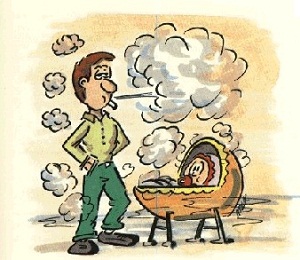According to two studies published in the August edition of the journal Pediatrics, kids exposed to secondhand smoking while growing up will likely become smoker themselves when they grow older.
In the US, there are around 5 million children exposed to secondhand smoking putting them at risk for diseases like asthma, ear infections, and sudden infant death syndrome.
Studies conducted from both Harvard and Washington Universities conclude kids exposed to the harsh environment such as secondhand smoke usually the ones with behavioral and mental-health problems. The possibility is high that they will end up as a smoker themselves as they grew older.
 Hillel Alpert and colleagues at Harvard learn secondhand smoking can increases odd by 50% of developing certain mental- and behavioral-health disorders.
Hillel Alpert and colleagues at Harvard learn secondhand smoking can increases odd by 50% of developing certain mental- and behavioral-health disorders.
Mental problems that can be developed from exposure to secondhand smoking include neurobehavioral disorders including attention deficit disorder, attention deficit hyperactivity disorder, and learning disabilities. Researchers based the study from responses of the parents or guardians of around 55,000 children ages 11 and younger, to the 2007 National Survey on Children’s Health conducted by Centers for Disease Control and Prevention.
Right now, an increase in the number of homes that are not smoking increases, but there is also an increase over the number of homes that are smoking. Alpert say there is evidence that will fortify what studies claims. Association between the neurobehavioral disorders and mental-health are true. Their research conclude about eight percent of that children whose expose to secondhand smoking has either difficulties in learning and six percent has ADD or ADHD.
Although, the telephone survey does not prove any clear connections between mental-health and second hand smoking, Alfred insisted about the strong evidence that connects the two.
Aside from the neurobehavioral disorder, which may be acquired from exposing one’s self to secondhand smoke, the April Archives of Pediatric and Adolescent Medicine also reveals the same person can also suffer from depressions and anxiety problem.
In order to reduce the risk of children having mental-health problems, a few states have already declared the ban of public smoking in areas such as restaurants and work sites. Other states go as far as banning smoking in a car with the presence of a child including Arkansas, California, Louisiana, and Maine implementing a law.
This must have been the reason why most teens, who are smoking are hard to reason out. It seems that they have mental disorders, which they acquire while growing up in their house. If only their parents were not smoking, then maybe they are not going to be a problem for school teachers.